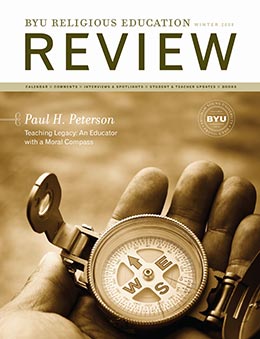Robert T. Millet (robert_millet@byu.edu) was a professor of ancient scripture at BYU when this was written.
In 1972 the Richard L. Evans chair of Christian Understanding was established. The chair was created to honor the work and ministry of Elder Richard L. Evans of the Quorum of the Twelve Apostles. Truman G. Madsen, professor of philosophy at Brigham Young University, was the first occupant of the chair. Dr. Madsen worked tirelessly to bring the message of the restored gospel to the attention of varied civic, religious, social, and philosophical groups. In addition, he invited scholars and leaders from many religious persuasions to Brigham Young University to participate in conferences, symposia, and special lectures.
Following Dr. Madsen’s retirement in 1991, the name of the Evans Chair was expanded to the Richard L. Evans Chair of Religious Understanding, thus signifying a shift in emphasis from Christian faiths to all religions, including Judaism, Islam, and other religions. In addition, with the approval of the university administration and the board of trustees, Religious Education effected a new organization. Instead of one chair occupied by one professor, two professorships were created. It was understood that persons appointed to occupy the professorships would work in the area of their expertise—religion, history, philosophy, social sciences, and so forth. These professorships are under the supervision and oversight of the dean of Religious Education, who is also the general director of the Religious Studies Center.
Evans professors’ teaching load is reduced, and they are expected to participate regularly in conferences and symposia in their given fields and to publish their research in reputable outlets. In addition, they draw upon their contacts outside the university and provide opportunities for scholars and religious leaders to visit the campus and experience BYU and Mormonism firsthand. It is expected that the professor’s home department will pay his or her salary, but the Evans Chair assists the department by providing funds for part-time instructors and for research assistance, travel, and the expenses for visiting scholars. The underlying premise for creating the Richard L. Evans Chair for Religious Understanding is that The Church of Jesus Christ of Latter-day Saints has a message that the rest of the world needs and may even hunger for. In this sense, the Evans Chair works toward the goals of the entire Church, not just BYU’s goals. It seeks to build friendships for the university and the Church.
As part of their outreach to members of the Church, the Religious Education faculty have traveled through- out the U.S. and to such countries as the UK, Ireland, Denmark, Norway, Sweden, Italy, Germany, and Austria to assist local Church units and Church Educational System personnel in strengthening the Latter-day Saints. Outreach to people of other faiths has included working with scholars and leaders from Azusa Pacific University, Baylor University, Claremont Graduate University, Columbia University, Denver Seminary, the University of Notre Dame, Roanoke College, Wabash College, and many others. Those who have held the Evans Chair since its establishment include Truman G. Madsen (philosophy), David Paulsen (philosophy), Darwin L. Thomas (sociology and family science), Larry C. Porter (Church history and doctrine), Roger R. Keller (Church history and doctrine), Robert L. Millet (ancient scripture), Fred E. Woods (Church history and doctrine), and Paul Y. Hoskisson (ancient scripture).
President Gordon B. Hinckley has said that we need to reach out to people of other faiths: “We want to be good neighbors; we want to be good friends. We feel we can differ theologically with people without being disagreeable in any sense. We hope they feel the same way toward us. We have many friends and many associations with people who are not of our faith, with whom we deal constantly, and we have a wonderful relationship. It disturbs me when I hear about any antagonisms I don’t think they are necessary. I hope that we can overcome them.”[1] President Hinckley also pleaded, “Let us be good citizens of the nations in which we live. Let us be good neighbors in our communities. Let us acknowledge the diversity of our society, recognizing the good in all people. We need not make any surrender of our theology. But we can set aside any element of suspicion, of provincialism, of parochialism.”[2] Finally, he said, “We can all be a little kinder, a little more generous, a little more thoughtful of one another. We can be a little more tolerant and friendly to those not of our faith, going out of our way to show our respect for them. We cannot afford to be arrogant or self-righteous. It is our obligation to reach out in helpfulness, not only to our own but to all others as well. Their interest in and respect for this Church will increase as we do so.”[3]
For more about the Evans Chairs, see the upcoming Religious Educator 9, no. 2 (April 2008).
Notes
[1] Gordon B. Hinckley, interview by Phil Riesen, KUTV, May 12, 1995, quoted in Sheri L. Dew, Go Forward with Faith: The Biography of Gordon B. Hinckley (Salt Lake City: Deseret Book, 1996), 576.
[2] Gordon B. Hinckley, in Conference Report, April 1997, 116.
[3] Gordon B. Hinckley, in Conference Report, April 1999, 116; see also April 2000, 110–11; April 2001, 4.
